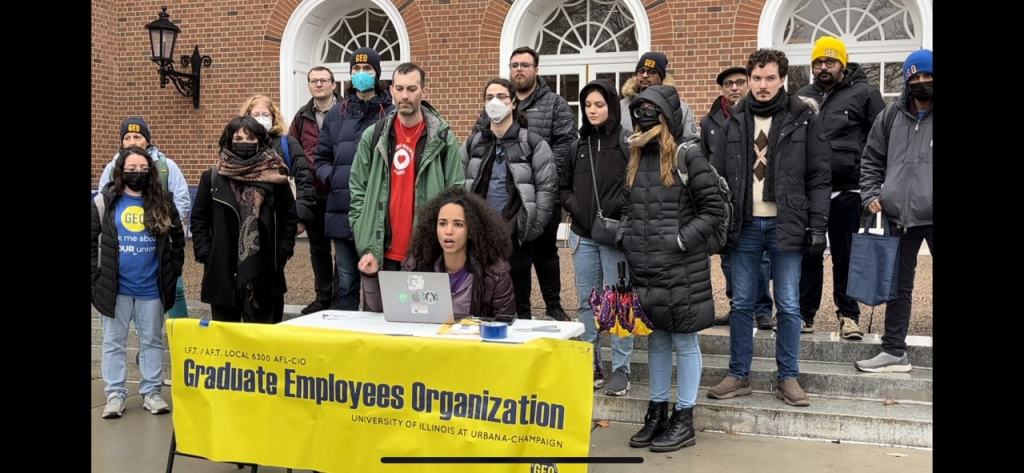Contract negotiations continue between University of Illinois, graduate workers

The GEO at the U of I hands a statement to the press after a bargaining session on Feb. 16 outside the Illini Union. The contract the union advocated for would ensure that wages outpace inflation and reduce the financial burden of healthcare. Essam Elkorghli, bargaining team member of the Graduate Employees’ Organization
After 23 bargaining sessions in 2022 and 2023, the Graduate Employees’ Organization, a union representing graduate workers, did not reach agreement with the University of Illinois at Urbana-Champaign regarding a new contract.
Union representatives told the university that they would discuss wages and health care at the meeting, which happened on Feb. 16 at the Illini Union. However, the university’s proposal did not address those issues.
“There was a lot of anger and upsetness in the room,” said Karla Sanabria Véaz, co-president of the Graduate Employees’ Organization. “The administration has constantly told us that they want to negotiate wages and health care.
“When we came prepared, they decided not to come prepared.”
By wasting time at the bargaining session, Sanabria Véaz said the university has shown that it is responsible for delaying contract negotiations.
“When that administration takes so long to reach agreements with the graduate workers that make this university run, … how can this university take seriously their mission of accessible public education?” Sanabria Véaz said.
When the university forces graduate workers to pick up multiple jobs because of low pay, the quality of education for undergraduate students suffers, she said.
The union is doing everything in its power to reach an agreement, Sanabria Véaz said. However, if admin continues being a barrier, she said graduate employees may become more incentivized to strike.
After nearly a year of bargaining, the union and university have reached an agreement on two out of seven articles, Sanabria Véaz said.
“Why is the university making it so difficult for us to do our jobs?” she asked.
The union sent its first contract in March 2022, Sanabria Véaz said.
“The university wasted almost six months asking reading comprehension questions of our proposal,” Sanabria Véaz said. “When they came back with a proposal on August 25th, the proposal was on a take-it or leave-it basis.
“[The university was] basically forcing us to only accept a 4% wage increase and two years of summer healthcare out of a five year contract in order to engage in serious negotiations.”
According to the university’s Human Resources website, the university presented its proposal on Aug. 25 at the 10th bargaining session.
If accepted, the graduate workers’ wages would have increased by 17.1% over the course of four years, with automatic summer waivers for the summers of 2023 and 2024, according to the website.
“This package proposal was designed as a signal to the GEO that the University is serious about reaching a swift resolution,” the website said.
University spokesperson Robin Kaler did not respond to questions about the union members’ comments.
The next bargaining session is scheduled for March 2 at the Illini Union.

